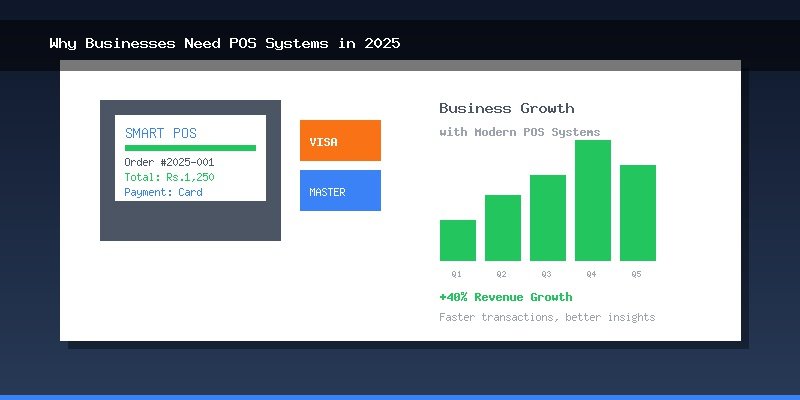
Why Businesses Need POS Systems in 2025
In today's rapidly evolving business landscape, having an efficient Point of Sale (POS) system isn't just an advantage—it's essential for survival. As we step into 2025, businesses across Pakistan and globally are discovering that modern POS systems are the backbone of successful operations.
**The Digital Transformation Reality**
Gone are the days when a simple cash register could handle your business needs. Today's customers expect seamless experiences, whether they're paying with cash, cards, mobile wallets, or even cryptocurrency. A modern POS system bridges this gap, offering multiple payment options while maintaining security and speed.
**Why Traditional Methods Fall Short**
Manual inventory tracking leads to stockouts and overstock situations that cost businesses thousands of rupees monthly. I've worked with restaurant owners who lost 30% of their potential revenue simply because they couldn't track which items were selling fast and which weren't moving at all.
**Real-World Benefits I've Witnessed**
During my work with Orderly Restaurant, implementing a comprehensive POS system resulted in:
- 40% reduction in order processing time
- 25% increase in daily transactions
- Complete elimination of billing errors
- Real-time inventory tracking that prevented stockouts
**Key Features Every Business Needs**
1. **Inventory Management**: Automatic stock level updates, low-stock alerts, and supplier integration
2. **Sales Analytics**: Daily, weekly, and monthly reports that show your best-performing products
3. **Employee Management**: Track working hours, sales performance, and commission calculations
4. **Customer Database**: Build loyalty programs and track customer preferences
5. **Multi-location Support**: Manage multiple branches from a single dashboard
**The Cost of Waiting**
Every day without a proper POS system costs you money. Manual processes are 3x slower, error-prone, and provide no insights into your business performance. In my experience helping businesses digitize, those who implemented POS systems early gained significant competitive advantages.
**Implementation Made Simple**
The good news? Modern POS systems are designed for easy adoption. Cloud-based solutions mean you can start using them immediately without complex installations. Training staff typically takes just 2-3 days, and the return on investment usually shows within the first month.
**Looking Ahead**
As we move through 2025, POS systems will integrate even more deeply with AI analytics, predictive inventory management, and automated marketing campaigns. Businesses that start now will be ready for these advanced features.
**Conclusion**
Whether you run a small retail shop, restaurant, or service business, a POS system isn't just about processing payments—it's about gaining complete control over your operations. The question isn't whether you need one, but how quickly you can implement it.
Ready to transform your business operations? Let's discuss how a custom POS solution can address your specific needs.
**The Digital Transformation Reality**
Gone are the days when a simple cash register could handle your business needs. Today's customers expect seamless experiences, whether they're paying with cash, cards, mobile wallets, or even cryptocurrency. A modern POS system bridges this gap, offering multiple payment options while maintaining security and speed.
**Why Traditional Methods Fall Short**
Manual inventory tracking leads to stockouts and overstock situations that cost businesses thousands of rupees monthly. I've worked with restaurant owners who lost 30% of their potential revenue simply because they couldn't track which items were selling fast and which weren't moving at all.
**Real-World Benefits I've Witnessed**
During my work with Orderly Restaurant, implementing a comprehensive POS system resulted in:
- 40% reduction in order processing time
- 25% increase in daily transactions
- Complete elimination of billing errors
- Real-time inventory tracking that prevented stockouts
**Key Features Every Business Needs**
1. **Inventory Management**: Automatic stock level updates, low-stock alerts, and supplier integration
2. **Sales Analytics**: Daily, weekly, and monthly reports that show your best-performing products
3. **Employee Management**: Track working hours, sales performance, and commission calculations
4. **Customer Database**: Build loyalty programs and track customer preferences
5. **Multi-location Support**: Manage multiple branches from a single dashboard
**The Cost of Waiting**
Every day without a proper POS system costs you money. Manual processes are 3x slower, error-prone, and provide no insights into your business performance. In my experience helping businesses digitize, those who implemented POS systems early gained significant competitive advantages.
**Implementation Made Simple**
The good news? Modern POS systems are designed for easy adoption. Cloud-based solutions mean you can start using them immediately without complex installations. Training staff typically takes just 2-3 days, and the return on investment usually shows within the first month.
**Looking Ahead**
As we move through 2025, POS systems will integrate even more deeply with AI analytics, predictive inventory management, and automated marketing campaigns. Businesses that start now will be ready for these advanced features.
**Conclusion**
Whether you run a small retail shop, restaurant, or service business, a POS system isn't just about processing payments—it's about gaining complete control over your operations. The question isn't whether you need one, but how quickly you can implement it.
Ready to transform your business operations? Let's discuss how a custom POS solution can address your specific needs.